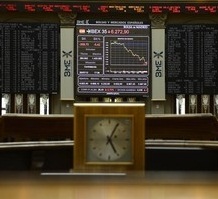 By JLM Campuzano, analyst, in Madrid | If the governor of the European Central Bank (ECB) said nothing new, why did the markets drop? To be sure, there was a deep sense of disappointment. His comments a week ago had sparked high expectations and, whether Mario Draghi admits it or not, hopes haven’t been met. And there is nothing worse than disillusioned investors.
By JLM Campuzano, analyst, in Madrid | If the governor of the European Central Bank (ECB) said nothing new, why did the markets drop? To be sure, there was a deep sense of disappointment. His comments a week ago had sparked high expectations and, whether Mario Draghi admits it or not, hopes haven’t been met. And there is nothing worse than disillusioned investors.
More disquieting, though, is that Draghi acknowledged the limitations of the monetary authority. From now on, the ECB intervention will be focused on the short end of the yield curve. Why? Because this is the subject of traditional monetary policy. But, what about the long end? That is up to the governments, and the central bank cannot and will not take their place.
Those who concluded that Draghi’s words changed little missed the implicit way in which the ECB marked what remains outside its field of action. The governor said that tension coming from the financial markets has increased the euro zone’s economic weakness, and that levels of pressure on sovereign risk threaten the very monetary union. It’s the States affected by this situation that must ask for help, which will come with conditions and application controls.
Unfortunately, with the euro bailout funds dependent on the decisions of the German Constitutional Courts and due to their diminished financial powers, even if some peripheral countries did ask for a rescue, the process wouldn’t be too swift. Would the ECB intervene, then? Most probably it would.
In the short term, nevertheless, uncertainty is going to shake the markets again. August isn’t propitious for experiments and central banks everywhere will keep an eye on events. Yet, the ECB should be ready to do something else than press conferences if volatility levels spike further.





Be the first to comment on "What Draghi really meant"